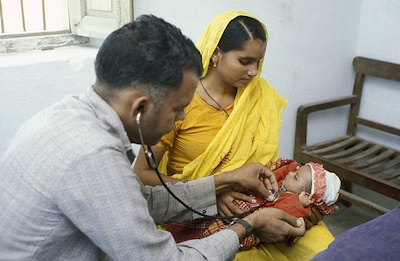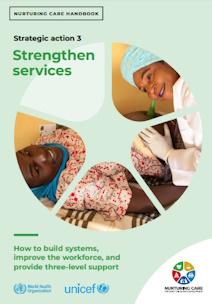This strategic action is about improving services for young children and their families, with health and nutrition services playing a pivotal role. Remember that health and nutrition services already contribute to nurturing care (e.g., counselling on breastfeeding, kangaroo mother care, growth monitoring, etc.). This work must continue. Look for opportunities to build on what is already in place, identify and support those children and families who require additional support, and enhance the capacity of the workforce.
Responsive feeding intervention
Responsive feeding was integrated into a parenting programme targeting caregivers of children under age 3 in a community with widespread malnutrition and household food insecurity. For information on the programme elements and the study results see this article. More.
‘Criança Feliz’ (‘Happy Child’) programme
Considered the world’s biggest ECD experiment, ‘Criança Feliz’ was instituted in 2016, through a presidential decree, to promote comprehensive development of children in their early years. Watch two videos about the program here. More.
Three levels of support
All families have access to a minimum package of services which includes home visits. Targeted services are provided for those requiring additional support (e.g., maternal mental health, child sleeping problems, breastfeeding support) and indicated support is provided for those at high risk or with complex needs. More.
Community health platforms
The Ghana Health Services has undertaken several steps to strengthen services. One example, is the integration of responsive caregiving and early learning into the Community-based Health Planning Services (CHPS) platform delivered by community health workers. More.
Baytna (‘Our home’)
The Baytna programme, implemented by Amna (formally known as Refuge Trauma Initiative) comprises of group sessions and follow up support for refugee children aged 0 to 6 years. Using art, mindfulness, dance, and storytelling, it helps children make sense of their experiences, develop coping skills and strengthen parent-child relationships. here. More.
Family participatory care for small and sick newborns
The Ministry of Health and Family Welfare practices Family Participatory Care (FPC) involving families in the care of small and sick newborns throughout the hospitalization period. Case study. Article. Operational guidelines.
India Academy of Pediatrics
With over 30’000 members, this association is actively working to elevate attention to early childhood development and build the capacity of paediatricians’ nationwide. More.
Enhanced services through health clinics
The Ministry of Health has established play corners in health clinics and equipped nurses and midwives to promote child development and respond to caregivers’ questions about their child’s development during routine consultations. Caregivers can also opt-in to receive automated messages via WhatsApp chatbot containing activities they can do at home with their children. More.
Kenya Paediatric Association
This association is cultivating champions, who in turn, are advocating for improved services and building the capacity of the workforce (paediatricians and beyond). More.
Universal progressive home visiting
Patronage nurses conduct home visits to all families. Those requiring additional support receive more visits and those at high risk or with complex needs benefit from support from a range of specialists (e.g., social workers, psychologists) and an individualized family plan. More.
Playboxes in waiting areas of health facilities
A playbox is a box or container housing age-appropriate household items, low-cost toys and books suitable for children aged 5 years and under. While caregivers and children wait for services, the box is kept in the waiting area for families to use. A designated person guides caregivers to select toys, counsels those who are experiencing difficulty interacting with their children, and gives key messages about developmental milestones. More.
Enhanced growth monitoring
CCD has been adopted for use across sectors. Within health services, the Growth and Development Check-ups Programme (CRED in Spanish) have been enhanced to go beyond simply measuring the height and weight of the child. Enhancements include family meetings, conversations about the child’s development, counselling on responsive caregiving and age-appropriate activities as well as improved interpersonal skills of the nurses (e.g., nurses call children by name, make eye contact). More.
Innovating primary health care
For over a decade, Serbia has invested in a paradigm shift from treatment-oriented care to holistic family-centred care through essential services at the primary health care level. This reform positions caregiver capacities and well-being as equally important as integral to ensuring child outcomes. Pre-service and continuing education have also undergone reforms to ensure the workforce is aligned with and equipped to deliver this vision. Case study. More.
Paediatric Association of Tanzania
The association is cultivating champions who can strengthen capacities of the health workforce and create nurturing health facilities (e.g., play corners). More.







